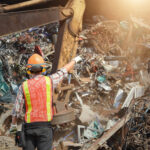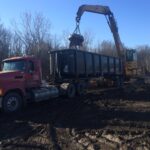In manufacturing, construction, and other industrial work, scrap metal builds up fast. If it’s not dealt with properly, it can eat up valuable space, slow down productivity, and cause logistical headaches.
But beyond that, poor scrap management can cost you. Clean, sorted copper, for example, can sell for up to $4 per pound. That’s money lost if your metal ends up mixed, contaminated, or dumped with general waste.
Efficient scrap metal disposal is a business decision. Done right, it keeps your site clean and your materials ready for resale or recycling.
Roll-off containers are built for this kind of job.
If you’re still relying on ad-hoc collection methods or making multiple trips with small loads, it’s time to rethink your process. Let’s break down how roll-off dumpsters work, why they’re worth the investment, and what to look for in a provider.
The Role of Roll-Off Containers in Scrap Metal Disposal
With a roll-off container, you don’t need forklifts or trailers for every haul. You pool all your metal into one sturdy bin, and once it’s filled, your provider takes it away for processing or recycling.
For fast-paced environments—construction crews, demo jobs, or production lines—this setup helps maintain order without slowing the team down. When there’s a marked recycling container on-site, workers are more likely to sort scrap correctly and keep disposal areas organized.
Benefits of Using Roll-Off Dumpster Containers for Scrap Metal
Efficiency
Some providers also offer scheduled pickups, so you’re not waiting around for a hauler to show up. This kind of predictability keeps your team focused on production, not logistics.
Roll-off containers also make it easier to keep the worksite safe and clean. When scrap is cleared consistently, there’s less risk of trip hazards, blocked access points, or fire danger around cutting or welding areas.
Cost-Effectiveness
Many providers also offer flat-rate pricing, which can make planning and budgeting a lot easier. Rather than being hit with surprise charges or fees for overloading small bins, you pay for the scrap metal dumpster that fits your actual volume.
Environmental Impact
With a roll-off container on site, you can keep recyclable materials separate from general trash. A system like this can help you better meet recycling targets and align with sustainability goals.
Choosing the Right Scrap Metal Dumpster for Your Needs
Type of Scrap Metal
If your loads are especially dense or include large, heavy parts, ask your provider about reinforced or high-weight-capacity metal dumpsters built specifically for scrap metal disposal.
Site Access and Layout
Best Practices for Scrap Metal Disposal with Roll-Off Containers
Sort Scrap Metal Before Dumping
If possible, keep labeled bins nearby for pre-sorting, especially on larger job sites where multiple materials are being collected at once. Removing non-metal attachments like plastic coatings or rubber can also help improve pricing when your scrap gets processed.
Follow Recycling Rules and Safety Guidelines
Make sure your team knows what can and can’t go in the roll-off dumpster. Post clear signage near the container, and work with a provider who’s familiar with local recycling laws. They can guide you on proper disposal and help you stay compliant.
Final Thoughts
If you’re serious about running a clean, efficient job site or production floor, roll-off containers are a must. They simplify scrap metal disposal, cut down on transportation costs, and help you stay on top of recycling efforts without slowing down your operation.
Don’t let scrap pile up or create unnecessary delays. Get the right container, from the right provider, and make waste management one less thing to worry about.
Looking for dependable roll-off dumpster service in Northwest Indiana? Dynamic Metal Recycling offers fast delivery, flexible rental options, and expert support for all your scrap metal disposal needs.
Reach out to us to learn more today!






